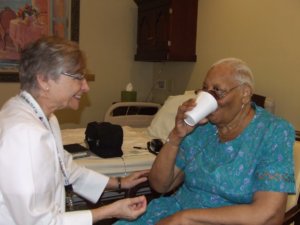Disease Management Tag
Tag: Disease Management
Jan
31
2017
#ChoosePT as an Alternative to Treat Chronic Pain
By Gina Epifano, PT, Director of Rehabilitation, Visiting Nurse
Chronic pain and the use of opioids for chronic pain management have been making headlines in recent months. Statistics show that opioid prescriptions have quadrupled since 1999, with 259 million opioid prescriptions written in 2012. That’s enough for every adult in the United States to have a bottle of pills! Overuse of opioids can lead to overdose, addiction, depression and withdrawal symptoms.
Nov
21
2016
Why Palliative Care isn’t just for Hospice Patients
When facing a serious illness, treatment options can be confusing. Some patients pursue aggressive treatment, while others choose to forego curative treatment and enter hospice care. However, there is another option called palliative care. Palliative care is often confused with hospice care, but it is not just for hospice patients. Many patients find palliative care a life-affirming, supportive option for dealing with their serious illness.
Nov
14
2016
Giving the Gift of Games Could Change Risk of Alzheimer’s
Games are common in checklists of gifts for Alzheimer's patients, because they provide mental stimulation and pleasant interaction for patients and their families and other caregivers.
A July 2016 report concerning reinterpretation of data from a 10-year study related to warding off Alzheimer's is creating a stir about cutting risk of the disease through computer brain games.
Registered nurses who aid Alzheimer's patients know all too well the impacts the disease has on patients' families. One concern that often arises is vulnerability of other family members to the disease and what they can do to avoid it.
Many members of Alzheimer's families are interested in whether brain training through computer games may be beneficial.
Nov
10
2016
New Information Emerges About Alzheimer’s in its Early Stage
Approximately 5.3 million Americans are living with Alzheimer’s disease. One in nine people over 65 suffer from this devastating illness. Researchers are keen to learn more about the factors that may improve early detection of the disease as well as characteristics that may place someone at greater risk. Now, new information is emerging about subtle changes that may be early signs of Alzheimer’s disease.
As we celebrate July 4th, we honor the spirit of independence that defines our nation—and also the dignity and freedom we strive to preserve every day for the people we serve. For 76 years, Visiting Nurse Health System has stood alongside Georgia families, helping patients remain in the place they cherish most: home.
Our work in home health and hospice care is rooted in compassion, choice, and respect for every individual’s journey. On this Independence Day, we recognize not only our country’s freedom, but also the personal freedoms we protect—by delivering care that helps people live and die with dignity, surrounded by those they love.
From our family to yours, Happy Fourth of July.
#choice #freedom #healthcarematters #visitingnursehealthsystem #hospiceatlanta

As we celebrate July 4th, we honor the spirit of independence that defines our nation—and also the dignity and freedom we strive to preserve every day for the people we serve. For 76 years, Visiting Nurse Health System has stood alongside Georgia families, helping patients remain in the place they cherish most: home.
Our work in home health and hospice care is rooted in compassion, choice, and respect for every individual’s journey. On this Independence Day, we recognize not only our country’s freedom, but also the personal freedoms we protect—by delivering care that helps people live and die with dignity, surrounded by those they love.
From our family to yours, Happy Fourth of July.
#choice #freedom #healthcarematters #visitingnursehealthsystem #hospiceatlanta
...
We`ve enjoyed celebrating our Certified Nursing Assistants for CNA this month and during last week`s CNA week!! Thank you to these amazing clinicians - your clinical skill, compassionate care, and strength you bring to every patient and family you serve makes a lasting impact. This month and every month, we’re grateful for the heart you put into your work. #CNA #hospiceatlanta #visitingnursehealthsystem #passion #Mission

We`ve enjoyed celebrating our Certified Nursing Assistants for CNA this month and during last week`s CNA week!! Thank you to these amazing clinicians - your clinical skill, compassionate care, and strength you bring to every patient and family you serve makes a lasting impact. This month and every month, we’re grateful for the heart you put into your work. #CNA #hospiceatlanta #visitingnursehealthsystem #passion #Mission ...
Today we pause to honor Juneteenth - a powerful reminder of resilience, freedom, and the continued pursuit of equity. At Visiting Nurse Health System, we recognize this day as more than a historic milestone, more so a call to action to listen, learn, and continue building a community where dignity and compassion are extended to all. Having provided care into the homes of Georgians for 76 years, our mission is rooted in the belief that each individual deserves equal access to quality health care. On this Juneteenth, we reaffirm that belief. Thank you to our community members, supporters and healthcare partners who help us serve with heart and humanity each day. #Juneteenth #EquityInCare #VisitingNurseHealthSystem #CommunityCare #hospiceatlanta

Today we pause to honor Juneteenth - a powerful reminder of resilience, freedom, and the continued pursuit of equity. At Visiting Nurse Health System, we recognize this day as more than a historic milestone, more so a call to action to listen, learn, and continue building a community where dignity and compassion are extended to all. Having provided care into the homes of Georgians for 76 years, our mission is rooted in the belief that each individual deserves equal access to quality health care. On this Juneteenth, we reaffirm that belief. Thank you to our community members, supporters and healthcare partners who help us serve with heart and humanity each day. #Juneteenth #EquityInCare #VisitingNurseHealthSystem #CommunityCare #hospiceatlanta ...
Happy Father’s Day from Visiting Nurse Health System! 💙
Today we honor fathers, father figures, grandfathers and the fathers who are caregivers -leading lead with love, strength, and quiet dedication at home and in our communities. Thank you for all you do!
#FathersDay #VisitingNurse #HonoringDads #visitingnursehealthsystem

Happy Father’s Day from Visiting Nurse Health System! 💙
Today we honor fathers, father figures, grandfathers and the fathers who are caregivers -leading lead with love, strength, and quiet dedication at home and in our communities. Thank you for all you do!
#FathersDay #VisitingNurse #HonoringDads #visitingnursehealthsystem
...
📢 We’re proud to share that Visiting Nurse Health System made front page news this week in Home Health Care News!
📰 Check out the featured article where our President & CEO, Dorothy Davis, talks about the growing financial pressures nonprofit home-based care providers face—especially in a market increasingly shaped by Medicare Advantage.
Dorothy shares insights on how competition for tier 1 patients and reimbursement challenges are shaping the future of care—not just for our patients, but for all of us who may one day need these vital services.
💬 We’re grateful to be part of this important conversation about the sustainability of nonprofit home health—and the critical business drivers that will define its future.
📖 Read the article here 👉https://vnhs.org/news/
#HomeHealthCare #NonprofitLeadership #MedicareAdvantage #ValueBasedCare #VisitingNurseHealthSystem #HealthCareNews #FutureOfCare

📢 We’re proud to share that Visiting Nurse Health System made front page news this week in Home Health Care News!
📰 Check out the featured article where our President & CEO, Dorothy Davis, talks about the growing financial pressures nonprofit home-based care providers face—especially in a market increasingly shaped by Medicare Advantage.
Dorothy shares insights on how competition for tier 1 patients and reimbursement challenges are shaping the future of care—not just for our patients, but for all of us who may one day need these vital services.
💬 We’re grateful to be part of this important conversation about the sustainability of nonprofit home health—and the critical business drivers that will define its future.
📖 Read the article here 👉https://vnhs.org/news/
#HomeHealthCare #NonprofitLeadership #MedicareAdvantage #ValueBasedCare #VisitingNurseHealthSystem #HealthCareNews #FutureOfCare
...
VNHS Spotlight!
We`re pleased to share our award winning Chief Innovation Officer, Jaqueline Ralph-Blair, was honored today with Modern Healthcare’s Leading Woman of 2025 award!
This prestigious award honors 30 leading women and 10 rising stars who are making lasting positive changes to the business of healthcare.
Celebrated today in Chicago at Modern Healthcare’s 15th Annual Leading Women Conference & Awards Luncheon, Jacqueline and her 2025 class of Modern Healthcare`s Leading Women, received a vanguard award honoring their achievements in and contributions to healthcare, to include directing strategic partnerships, designing cutting-edge technologies, and spearheading revenue-boosting initiatives.
Congratulations Jacqueline and THANK YOU for all you do!!
#leadership #CSuite #givingback #healthcare #visitingnursehealthsystem #hospiceatlanta

VNHS Spotlight!
We`re pleased to share our award winning Chief Innovation Officer, Jaqueline Ralph-Blair, was honored today with Modern Healthcare’s Leading Woman of 2025 award!
This prestigious award honors 30 leading women and 10 rising stars who are making lasting positive changes to the business of healthcare.
Celebrated today in Chicago at Modern Healthcare’s 15th Annual Leading Women Conference & Awards Luncheon, Jacqueline and her 2025 class of Modern Healthcare`s Leading Women, received a vanguard award honoring their achievements in and contributions to healthcare, to include directing strategic partnerships, designing cutting-edge technologies, and spearheading revenue-boosting initiatives.
Congratulations Jacqueline and THANK YOU for all you do!!
#leadership #CSuite #givingback #healthcare #visitingnursehealthsystem #hospiceatlanta
...
Today, we remember and honor all who gave their lives in service to our country. Their courage, sacrifice, and dedication will never be forgotten. Forever grateful. 🕊️
#MemorialDay #HonorAndRemember #NeverForget #hospiceatlanta #visitingnursehealthsystem

Today, we remember and honor all who gave their lives in service to our country. Their courage, sacrifice, and dedication will never be forgotten. Forever grateful. 🕊️
#MemorialDay #HonorAndRemember #NeverForget #hospiceatlanta #visitingnursehealthsystem
...
🏌️♀️ We’re proud to be part of a great cause on and off the course!
Visiting Nurse Health System | Hospice Atlanta was honored to participate in and sponsor this year`s LeadingAge Georgia Golf Tournament—an event that brings together healthcare partners and changemakers in senior care.
This tournament helps sustain the vital work of LeadingAge Georgia, empowering member organizations that serve and advocate for our aging population across the state. It’s a privilege to be part of a community so committed to compassionate, quality care for older adults. ⛳️💙
#LeadingAgeGA #GolfForACause #SeniorCare #VisitingNurseHealthSystem #HospiceAtlanta #AgingWithDignity #CommunitySupport

🏌️♀️ We’re proud to be part of a great cause on and off the course!
Visiting Nurse Health System | Hospice Atlanta was honored to participate in and sponsor this year`s LeadingAge Georgia Golf Tournament—an event that brings together healthcare partners and changemakers in senior care.
This tournament helps sustain the vital work of LeadingAge Georgia, empowering member organizations that serve and advocate for our aging population across the state. It’s a privilege to be part of a community so committed to compassionate, quality care for older adults. ⛳️💙
#LeadingAgeGA #GolfForACause #SeniorCare #VisitingNurseHealthSystem #HospiceAtlanta #AgingWithDignity #CommunitySupport
...
🎉 Please join us in celebrating our Employee of the Month – Dykia Brummitt! 🌟
Dykia’s dedication, compassion, and positive team spirit make a lasting impact on everyone she cares for. Her commitment to our mission and values here at Visiting Nurse Health System shines through in all she does, and we are so grateful to have her on our team. 💙👏
Congratulations, Dykia—you truly embody what it means to provide care with heart! 🏆
#EmployeeOfTheMonth #VisitingNurseProud #HealthcareHeroes #ThankYouDykia #visitingnursehealthsystem

🎉 Please join us in celebrating our Employee of the Month – Dykia Brummitt! 🌟
Dykia’s dedication, compassion, and positive team spirit make a lasting impact on everyone she cares for. Her commitment to our mission and values here at Visiting Nurse Health System shines through in all she does, and we are so grateful to have her on our team. 💙👏
Congratulations, Dykia—you truly embody what it means to provide care with heart! 🏆
#EmployeeOfTheMonth #VisitingNurseProud #HealthcareHeroes #ThankYouDykia #visitingnursehealthsystem
...
🎉 Celebrating Nurses Month continues with our incredible nursing team at Hospice Atlanta | Visiting Nurse Home Health! 💙🩺Here`s our Home Health team celebrating this week! We’re so proud of our compassionate, dedicated nurses who go above and beyond every day to care for our community in the comfort of their home. Thank you for all that you do! 👏
#NursesMonth #VisitingNurseHealthSystem #ThankYouNurses #hospiceatlanta

🎉 Celebrating Nurses Month continues with our incredible nursing team at Hospice Atlanta | Visiting Nurse Home Health! 💙🩺Here`s our Home Health team celebrating this week! We’re so proud of our compassionate, dedicated nurses who go above and beyond every day to care for our community in the comfort of their home. Thank you for all that you do! 👏
#NursesMonth #VisitingNurseHealthSystem #ThankYouNurses #hospiceatlanta
...
We want to extend our heartfelt thanks to everyone who joined us last Saturday for Hospice Atlanta`s 3rd Annual Resilience bereavement event. Whether you came to listen, speak, or simply be present, your participation helped create a space of healing, support, and strength.
A special thank you to our incredible speakers, who so generously shared their stories, insights, and compassion. Your words touched many and reminded us all that even in grief, we are not alone.
To every attendee — your presence was powerful. Thank you for showing up for yourselves, and for each other. Together, we honored our losses and found comfort in community. Thank you to our gracious volunteers and staff who supported the event operations. Let’s continue to walk this path together. 💛
#ResilienceEvent #GriefSupport #ThankYou #HealingTogether #hospiceatlanta #visitingnursehealthsystem

We want to extend our heartfelt thanks to everyone who joined us last Saturday for Hospice Atlanta`s 3rd Annual Resilience bereavement event. Whether you came to listen, speak, or simply be present, your participation helped create a space of healing, support, and strength.
A special thank you to our incredible speakers, who so generously shared their stories, insights, and compassion. Your words touched many and reminded us all that even in grief, we are not alone.
To every attendee — your presence was powerful. Thank you for showing up for yourselves, and for each other. Together, we honored our losses and found comfort in community. Thank you to our gracious volunteers and staff who supported the event operations. Let’s continue to walk this path together. 💛
#ResilienceEvent #GriefSupport #ThankYou #HealingTogether #hospiceatlanta #visitingnursehealthsystem
...
💐Happy Mother`s Day!💐
#mothersday #hospiceatlanta #visitingnursehealthsystem

💐Happy Mother`s Day!💐
#mothersday #hospiceatlanta #visitingnursehealthsystem
...





